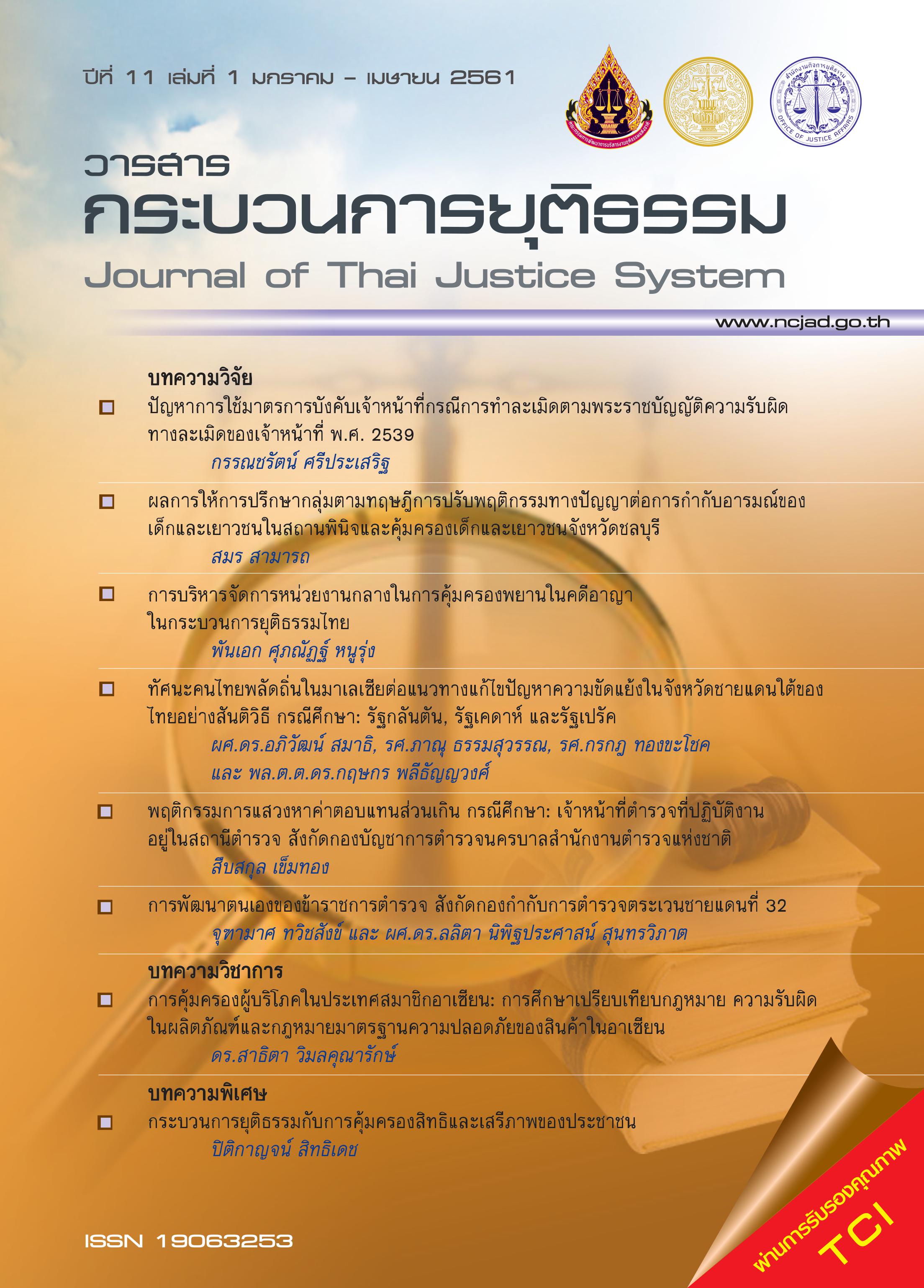ผลการให้การปรึกษากลุ่มตามทฤษฎีการปรับพฤติกรรมทางปัญญาต่อการกำกับ อารมณ์ของเด็กและเยาวชนในสถานพินิจและคุ้มครองเด็กและเยาวชนจังหวัดชลบุรี
Main Article Content
บทคัดย่อ
การศึกษาวิจัยครั้งนี้มีวัตถุประสงค์เพื่อศึกษาผลการให้การปรึกษากลุ่มตามทฤษฎีการปรับพฤติกรรมทางปัญญาต่อการกำกับอารมณ์ของเด็กและเยาวชนในสถานพินิจและคุ้มครองเด็กและเยาวชนจังหวัดชลบุรี กลุ่มตัวอย่างเป็นเด็กและเยาวชนในสถานพินิจและคุ้มครองเด็กและเยาวชนจังหวัดชลบุรี จำนวน 14 คน สุ่มเข้ากลุ่มทดลองและกลุ่มควบคุม กลุ่มละ 7 คน เครื่องมือที่ใช้ในการวิจัยคือแบบมาตรวัดการกำกับอารมณ์ตนเอง และโปรแกรมการปรึกษากลุ่มตามทฤษฎีการปรับพฤติกรรมทางปัญญา ดำเนินการทดลอง จำนวน 12 ครั้งๆ ละ 60 นาที วัดผลการทดลอง 3 ระยะ คือ ระยะก่อนการทดลอง ระยะหลังการทดลอง และระยะติดตามผล วิเคราะห์ผลการวิจัยด้วยการวิเคราะห์ความแปรปรวนแบบวัดซ้ำประเภทหนึ่งตัวแปรระหว่างกลุ่มและหนึ่งตัวแปรภายในกลุ่ม และทดสอบความแตกต่างเป็นรายคู่ด้วยวิธีบอนเฟอร์โรนี่ ผลการวิจัยพบว่ากลุ่มทดลอง มีคะแนนการกำกับอารมณ์แตกต่างจากกลุ่มควบคุม ทั้งในระยะหลังการทดลอง และระยะติดตามผล อย่างมีนัยสำคัญทางสถิติและกลุ่มทดลองมีคะแนนการกำกับอารมณ์ ในระยะก่อนการทดลอง ระยะหลังการทดลอง และระยะติดตามผล แตกต่างกันอย่างมีนัยสำคัญทางสถิติที่ระดับ .05
Article Details
ต้นฉบับที่ได้รับการตีพิมพ์ในวารสาร เป็นลิขสิทธิ์ของวารสารกระบวนการยุติธรรม แต่ความคิดเห็นที่ปรากฏในเนื้อหาของบทความในวารสารกระบวนการยุติธรรม ถือเป็นความรับผิดชอบของผู้เขียนแต่เพียงผู้เดียว
เอกสารอ้างอิง
สุชา จันทร์เอม. (2544). จิตวิทยาเด็กเกเร (พิมพ์ครั้งที่ 3). กรุงเทพฯ: โรงพิมพ์ไทยวัฒนา
พานิช.
ส่าหรี จิตตินันทน์. (2544)การปฏิบัติงานแบบสหวิชาชีพในการคุ้มครองเด็กที่ถูกทารุณ
กรรมและทอดทิ้ง (พิมพ์ครั้งแรก) กรงเทพ: มูลนิธิศูนย์พิทักษ์สิทธิเด็ก
ธวัชชัย ไทยเขียว, ศิริประกาย วรปรีชา (2545) รายงานสาเหตุแนวทางและการป้องกัน
กรณีป้องกันการ หลบหนีของเด็กและเยาวชน เอกสารกรมพินิจและคุ้มครองเด็ก
และเยาวชน (ww2.djop.moj.go.th) เข้าถึงข้อมูลเมื่อวันที่ 3 ตุลาคม 58
ประทุม แป้นสุวรรณ. (2545). การให้คำปรึกษากลุ่มด้านเพศศึกษาวัยรุ่นในกลุ่มเสี่ยง.
กรุงเทพฯ: พัฒนาศึกษา
สินีนาฏ ไชยวงศ์ (2556) ผลของกลุ่มการปรึกษาเชิงจิตวิทยาแนวปัญญาพฤติกรรมนิยมต่อ
การกำกับอารมณ์ตนเองและปัจจัยที่เกี่ยวข้องในเด็กที่มาจากครอบครัวหย่าร้าง
วิทยานิพนธ์ปริญญาศิลปะศาสตร์ มหาบัณฑิต สาขาวิชาจิตวิทยา จุฬาลงกรณ์
มหาวิทยาลัย.
Beck, A.T.(1976) . C ognitive therapy and emotion disorder. New York:
International Universities Press.
Ellis, A. (1962) Reason and emotion in psychotherapy. New York: Stuart
MAIA SZALAVITZSEPT, “The 4 traits That Put Kids at Risk for
Addiction” The New York Time, SEPT.29, 2016, https://
www.nytimes.com/2016/10/04well/family/the-4-traits-that-put-kids-at-risk-for-addiction.html?_r=0 (accessed Sept 29, 2016)


